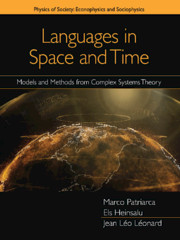Preface
Published online by Cambridge University Press: 04 June 2020
Summary
This book provides a short and selective overview of some quantitative methods of complexity theory and statistical mechanics used in the analysisof linguistic databases and in the study of language dynamics, meaningforemost the quantitative study of language spread and evolution in terms ofmathematical models. A number of applications have been included in the bookto introduce, illustrate, and explain the theoretical methods considered.Most of the methods discussed are imported from various disciplines, inparticular, the hard sciences, where they are standard tools, or have beendeveloped into their current state from new fields, as in the paradigmaticexample of the theory of complex networks developed withinthe field of complex systems theory.
The general aim of the book is to show the possible advantages in predictingand understanding language processes obtained by integrating the knowledgeprovided by classical linguistic methods, on one hand, with the informationextracted by applying mathematical tools of complexity theory, on the otherhand. The general message that we intend to communicate is not new: theinterdisciplinary interactions described here have already begun atdifferent times and in many ways. These interactions are due in part to thetruly interdisciplinary nature of linguistics and, in particular, to itslogical framework, representing a fertile terrain for the introduction ofnew quantitative methods. We are still in the first stages of a realintegration between linguistics and complex systems and there is still along way ahead, full of challenges and problems to be studied, before wereach our ideal.
The exposition of material from the technical point of view is gradual,starting from basic concepts and models and moving toward more complexfeatures of mathematical modeling and data analysis methods. The structureof the book is designed around some general topics, such as the nature oflanguage groups and some linguistic processes, such as language competitionand language evolution. We have tried to keep theory linked withapplications to real linguistic problems and have avoided technical details,in order to maintain the book at a general or introductory level, suitableboth to researchers and advanced students interested in theinterdisciplinary field of language dynamics.
- Type
- Chapter
- Information
- Languages in Space and TimeModels and Methods from Complex Systems Theory, pp. xvii - xxPublisher: Cambridge University PressPrint publication year: 2020

